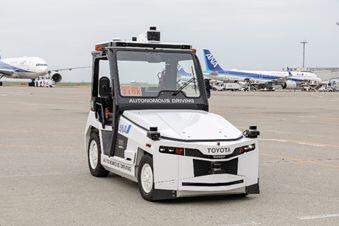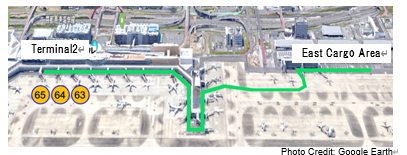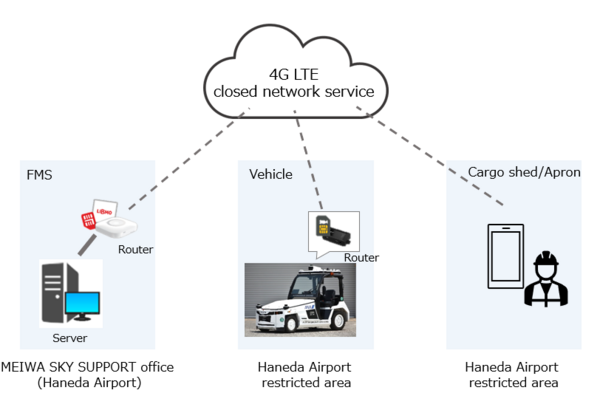All Nippon Airways and Toyota Industries Partner for Japan's First-Ever Level-4 Airport Cargo Transportation
All Nippon Airways
Toyota Industries Corporation
[Translation]
|
TOKYO, Jul. 16, 2024 - All Nippon Airways (ANA), Japan's largest airline and a 5-Star airline for 12 consecutive years, recently partnered with Toyota Industries Corp. (Toyota Industries) to conduct Japan's first ever Level-4*1 test autonomous tow tractor*2 trial. The test, focusing on domestic cargo transportation, took place within a restricted area*3 at Haneda Airport from July 1-19, 2024.
Since February 2019, the two companies have conducted a series of Level-3*4 demonstrative operation tests at Kyushu Saga International Airport, Chubu Centrair International Airport and Haneda Airport. These trials focused on transporting actual customer baggage and cargo containers, with a goal to implement Level-4 autonomous tow tractors for practical use.
In the most recent test operation held at Haneda Airport, the largest airport in Japan equipped with many aircraft and various types of airport support vehicles, the companies confirmed whether Level-4 autonomous traveling can be performed safely using an autonomous tow tractor hauling cargo containers. Additionally, the test identified possible operational issues on the apron and in front of cargo sheds. The transportation route is approximately 2 km one-way between apron 63, 64 and 65 in Domestic Terminal 2 and the East Cargo Area.
The autonomous tow tractor boasts a high-performance self-location and obstacle detection system with built-in redundancy. This advanced system allows it to effectively respond to a variety of environmental and operational changes throughout the airport.
The companies installed a newly developed Fleet Management System (FMS) to streamline operations. The FMS unifies information, including transportation instructions for vehicles traveling to the apron or cargo areas, work instructions for on-site staff and vehicle operation management.
Equipped with a remote monitoring function, the tractor can assess situations around the vehicle. This allows for enhanced safety during Level-4 autonomous travel by offering quick responses to any abnormalities. Testing the FMS with a single vehicle enabled the companies to identify and address potential operational and economic challenges ahead of introducing a future fleet of autonomous tow tractors.
To address ground handling staff shortages and ensure the future of sustainable airport services, ANA and TICO, with support from the Ministry of Land, Infrastructure and Transport (MLIT) Civil Aviation Bureau, are launching initiatives to implement autonomous tow tractors. The goal is to achieve Level-4 autonomous transportation by the end of 2025, ultimately advancing aviation innovation.
| *1 | A level of fully autonomous traveling under certain conditions, in which a system performs all driving tasks. |
| *2 | A vehicle used to tow carts and containers containing baggage and cargo at airports and other locations. |
| *3 | Runways and other take-off and landing areas, taxiways, aprons, control towers, and other areas that restrict access. |
| *4 | A level on which a system performs all driving tasks, but the driver must respond appropriately to requests for intervention by the system. |
Overview of Test Operation
| Period | July 1-9, 2024 | ||
| Location | Restricted area at Haneda Airport | ||
| Autonomous traveling course | Between apron 63, 64 and 65 in Terminal 2 and the East Cargo Area |
||
| Vehicle | Autonomous two tractor | ||
| Speed (maximum) | 15km/h | ||
| Towing weight (maximum) | 13 tons while autonomous traveling | ||
| Control method | Road pattern matching system*5 Global navigation satellite system (GNSS) 3D light detection and ranging (LiDAR)*6 |
||
| *5 | A system to obtain vehicle position and posture information by matching road surface images captured by a camera mounted on the vehicle with road surface image map data created in advance. |
| *6 | A sensor that can accurately measure the distance to an object by emitting a laser beam onto the object and measuring the reflected light and is used to determine the situation around the vehicle. |
Overview of the FMS
The FMS monitors vehicle status and provides transportation and support instructions to those in charge of pre- and post-transportation processes.
About ANA
ANAHD was established in 2013 as the largest airline group holding company in Japan, comprising 70 companies. It offers three distinct airline brands: ANA, Peach, the leading LCC in Japan, and AirJapan, launched in 2024 for international routes covering Asia. ANA's legacy of superior service has earned SKYTRAX's 5-Star rating every year since 2013, making it the only Japanese airline to win this prestigious designation for 12 consecutive years. ANAHD has been selected as a member of the Dow Jones Sustainability World Index list for eight consecutive years and the Dow Jones Sustainability Asia Pacific Index list for nine consecutive years.
For more information about ANA and ANA HD, please visit:  https://www.ana.co.jp/group/en/
https://www.ana.co.jp/group/en/
About Toyota Industries Corporation Toyota Industries was founded in 1926 in Japan as a manufacturer of the automatic looms which the founder, Sakichi Toyoda had invented and perfected. Since then Toyota Industries has expanded the scope of its business domains and currently manufactures various products including textile machinery, car air-conditioning compressors, automobiles, engines, car electronics, and materials handling equipment. Especially, our lift trucks, car air-conditioning compressors and air-jet looms are world-wide best sellers*7.
*7 Based on Toyota Industries Corporation's assessment.



